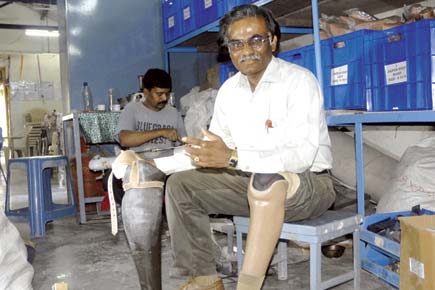A train accident, which led to the amputation of his right leg at 16, introduced Ramesh Thakur to the famous Jaipur foot; he then decided to use the prosthesis to help people across the globe walk again

Ramesh Thakur may not have invented the famous Jaipur foot, but with the help of the revolutionary prosthesis, the 48-year-old has helped thousands of people, spanning races, creeds and continents, get back on their feet. For the last eight years, every individual who has entered the King George Memorial Hospital in Mahalaxmi with hopes of being able to walk again has been able to do so.
ADVERTISEMENT

After spending 25 years helping people in different countries, Ramesh Thakur is now working at the Ratna Nidhi Charitable Trust at Mahalaxmi to continue his life’s mission. Pic/Suresh KK
Be it as a Red Cross volunteer, or working under the Untied Nations and even as a representative of India, Thakur, working along with the peace mission battalion of Indian Army, has reached out to people in over 15 countries, including Sudan, Afghanistan, Vietnam and Namibia, with just one mission to get disabled people back on their feet.
A former colleague of Baba Amte, and the Limca Book record holder for completing the 100 meter race (handicaps) in 17.29 seconds in 2005, the fastest Indian to do so, Thakur now works at Ratna Nidhi Charitable Trust, an NGO in Mahalaxmi, to help people get rid of their crutches and wheelchairs.
Humble beginning
Thakur was born in Bharuch, a village in Gujarat, to a middle-class family. His artistic aspirations came to a screeching halt when he lost his right leg in a train accident at the age of 16. “I was admitted to a civic hospital where I witnessed doctors trying their best to save my limb, but couldn’t.
It seemed liked the world crashed around me when they amputated my leg. A few days later, a doctor showed me a magazine article about Jaipur foot, a new, affordable and effective prosthesis, invented to help disabled people walk in matter of hours. That article changed the course of my life,” said Thakur.
He travelled to Jaipur and met Devendra Raj Mehta, founder of Bhagwan Mahavir Viklang Sahyata Samiti. Thakur not only requested Mehta to get the prosthetic leg, but also asked for a job. Mehta asked the 16-year-old what kind of work he would be able to do.
“I had completed an electrical supervisor course after my Std X examination. I told him I could fix machines and electric circuits, but he didn’t believe me. As a test, he took me to a machine that had not been working and I fixed it within a few hours. He gave me the job,” recounted Thakur.
Learning the art
Thakur’s aspirations did not end there. He spent years working under Ram Chander Sharma and Dr P K Sethi the inventors of Jaipur foot and decided to carry the baton of this inexpensive prosthesis around the world to help disabled people, who cannot afford the costly variants.
Aside from participating with 87 cyclists, travelling from Arunachal Pradesh to Okha with Baba Amte for his Bharat Jodo Abhiyan, Thakur’s journey to help people took him to 15 countries, alongside the Indian Army. “As representatives of the country, our mission was to attend to the disabled, needy and injured people.
We did our work without fear and consider it the highest service towards mankind,” said Thakur. Asked if he was ever intimidated while working in volatile areas of the world, Thakur said that he was instead amazed and humbled by the generosity of people. “In Afghanistan, the security guard assigned to me would refuse to eat till I did not sit with him.
In Vietnam, we helped a man walk again who had been disabled for 20 years. He praised us in front of their Prime Minister, who, impressed by the efforts of the Indian doctors, personally called P V Narasimha Rao (then Prime Minister of India) and promised that the Vietnamese army would teach Indian soldiers the famous Guerrilla Fighting technique in return,” recalled Thakur.
Remembering a Nairobi doctor, he mentioned how he offered his food and could not even look back when Thakur was leaving the country. “We made many wonderful relationships, made many smile when they could stand, walk and run on their feet.
Many countries and their ministers applauded our efforts, but in the end, it was our country’s name that was being praised, which was an enormous satisfaction,” said Thakur. After spending 25 years serving the world, Thakur finally settled in Mumbai in 2006.
“I was happy that our work in different countries helped improve their relations with India, but I realised that it was time to work for my own people. That is when Raj-ubhai Mehta asked me to handle his Mumbai centre. When I see someone walk with crutches, I want him/her to walk free of any support,” he said.
 Subscribe today by clicking the link and stay updated with the latest news!" Click here!
Subscribe today by clicking the link and stay updated with the latest news!" Click here!






